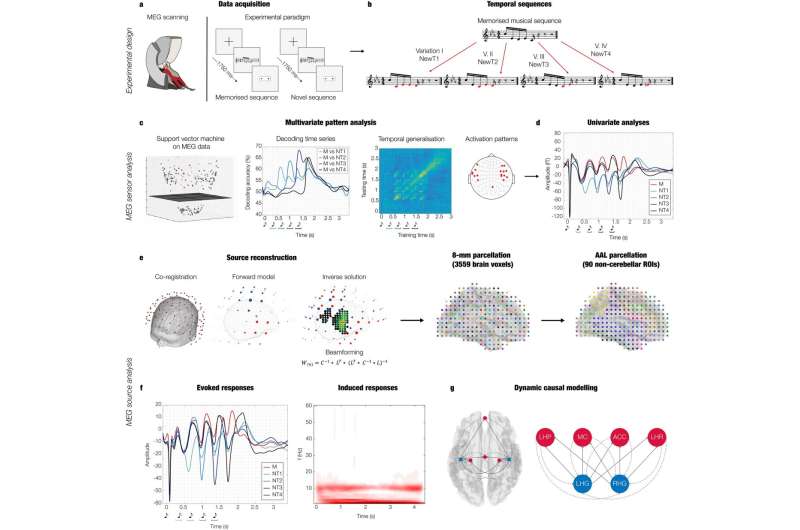This article has been reviewed according to Science X's editorial process and policies. Editors have highlighted the following attributes while ensuring the content's credibility:
fact-checked
peer-reviewed publication
trusted source
proofread
Music study reveals brain's predictive power

Ever heard just a snippet of a song and instantly known what comes next? Or picked up the rhythm of a chorus after just a few notes? New research from the Center for Music in the Brain at Aarhus University and the Centre for Eudaimonia and Human Flourishing at the University of Oxford has uncovered what happens in our brain when we recognize and predict musical sequences.
The work is published in the journal Nature Communications.
When we turn on the radio and our favorite song starts playing, our brain reacts in a complex pattern, where areas that process sound, emotions, and memory are activated. In a feedforward and feedback loop, our auditory cortex first responds to the sounds and sends information to other brain areas, like the hippocampus, which is involved in memory, and the cingulate gyrus, which helps with attention and emotional processing. This process helps us recognize songs quickly and predict what comes next, making listening to music an enjoyable and familiar experience.
Knowing how our brain reacts to music can play a pivotal role in understanding our cognitive functions, explains one of the leading researchers behind the study, Associate Professor Leonardo Bonetti from the Center for Music in the Brain at Aarhus University, "Our research provides detailed insights into the brain's ability to process and predict music and contributes to our broader understanding of cognitive functions. This could make a difference for studying brain health, as it offers potential pathways to explore how aging and diseases like dementia affect cognitive processing over time."
In fact, understanding how our brain rocks along to Bohemian Rhapsody or reacts to a childhood classic may help researchers detect dementia in the future.
"In the long run, these findings could inform the development of screening tools for detecting the individual risk of developing dementia just using the brain activity of people while they listen to and recognize music," says Bonetti.
In the study, the researchers measured the brainwaves of 83 people as they listened to music, and they will follow up with additional studies, says Bonetti.
He adds, "Future studies could explore how these brain mechanisms change with age or in individuals with cognitive impairments. Understanding these processes in more detail could lead to new interventions for improving cognitive function and quality of life for people with neurological conditions."
More information: L. Bonetti et al, Spatiotemporal brain hierarchies of auditory memory recognition and predictive coding, Nature Communications (2024). DOI: 10.1038/s41467-024-48302-4



















